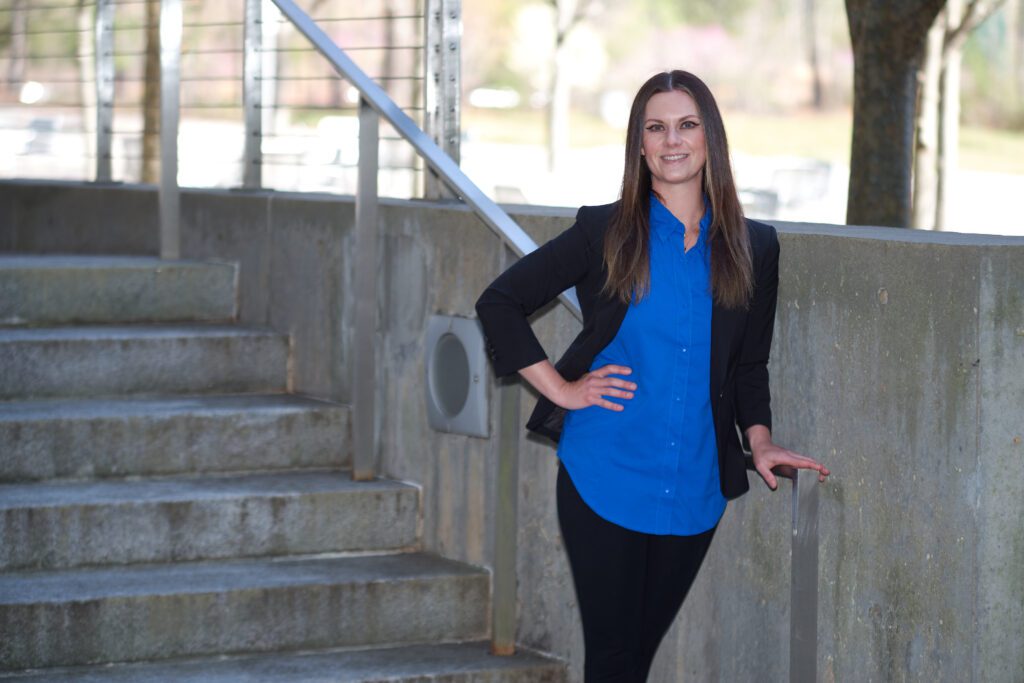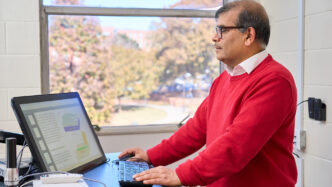Three out of every four medical technology startups fail.
Wren Gregory, who earned her Ph.D. in physics from Clemson University in 2020, wants to help change that.
She is the co-founder and CEO of SE.ai, a software startup to help early medical technology companies navigate the U.S. Food and Drug Administration approval process more efficiently using artificial intelligence.
“The biggest hurdle is getting through the FDA,” said Gregory, who said she and her co-founder have been involved in multiple ventures that struggled because they ran out of money trying to get through the approval process. “The average time is about three years to get through the whole process from start to finish, and that’s too long. Many of these startup companies don’t have three years of runway.”

The company, which was incorporated this year, is developing an AI software platform that will help companies save time and money getting through the approval process.
“We know there are potential solutions for many diseases. There are treatments for them. Or there’s a way to mitigate the side effects. There’s a way to mitigate the risk associated with it. There are all sorts of people working on these things, and they’re often the people who care the most because of personal experience, even personal heartbreak. That’s their passion project,” Gregory said.
She continued, “It’s really about how do you empower the people with the passion to bring it to market in a way that they can afford to do it. If the venture dies before they can do that, there’s no guarantee that anyone is ever going to go through that process to bring it to market.”
As a physicist, Gregory said she loves that she and others like her think about the world in systems, not individual pieces.
“What we’re tackling requires somebody to look at it from a systems perspective. There’s not one tool that’s going fix everything. What we’re really building is this pipeline of very specialized tools to handle different parts of the process, different systems in the process,” she said.
Non-traditional path
Gregory’s path to where she is today is far from traditional.
Gregory, who calls herself a math nerd, grew up in a scientific family. She lived next to her grandmother’s house, which had a “garage” with a home-built observatory, complete with a crank-to-open rollback roof and massive telescope.
“Astronomy is a gateway subject for people to like physics because it’s so beautiful and they respond to the images that come from it. It’s vast. It’s full of wonder, and people get excited about it,” she said.
Gregory dropped out of high school when she was 16. She earned her GED certificate and was accepted into a university but ultimately decided to pursue life’s lessons instead.
She moved from Montana to Asheville, North Carolina, and hadn’t planned on going to college until her future mother-in-law, a community college teacher, convinced her she should. She enrolled at Asheville-Buncombe Technical Community College, where she planned to study nursing.
Change in plans
Her plans changed when she took her first physics class.
“It was the hardest class I had ever taken. It was love at first sight. School was never particularly hard for me. In fact, it often felt unexciting. But I knew I was going to have to work really hard to pass that class and I liked that,” she said. “I knew I wanted to study physics, and I changed my major.”
After earning an associate’s degree in physics at A-B Tech, she enrolled at the University of North Carolina Asheville. While earning bachelor degrees in physics and applied mathematics, she and other physics students found some equipment in an abandoned room. It was an old gas laser the chair of the department had built when he worked at the Oak Ridge National Laboratory. He allowed them to apply for a grant to rebuild the CO2 laser.
“It was the coolest thing,” she said.
But Gregory didn’t know if she wanted to go to graduate school. She met Joan Marler, an associate professor in the Clemson Department of Physics and Astronomy, at a Women in Physics conference. Marler told her to come down and tour Clemson.
Knew what she wanted to do
One of the stops was the Clemson Nanomaterials Institute.
“I was used to little labs, the kind where they made you draw the warning sign and tape it to the door,” she said. “When I walked into the lab at CNI, it was so loud and there was state-of-the-art equipment everywhere. I instantly fell in love with it. I knew that’s what I wanted to do.”
While completing her Ph.D. at Clemson, she researched and published multiple papers on both the applications of carbon and other nanomaterials as well as the interactions between these materials and the human body, contributing to research and development in the areas of nanomedicine and nano diagnostics.
After graduation, Gregory went to work as a senior scientist for a startup in Greenville, South Carolina, that focused on pharmacogenomics.
Since she had never taken a genetics class and had very few biology courses, she said she probably wasn’t the ideal candidate for the job.
“When I met the team, I really resonated with the mission, which was basically reduce the overprescription of opioids and tailoring post-surgical and disease treatment regimens for patients based on their genetics,” Gregory said.
During the pandemic, the company did a lot of COVID testing for pre-surgery patients. “We were the fastest and most accurate diagnostic company in the region.”
By the end of the pandemic, Gregory was leading the company’s research division, drafting clinical trials and recruiting principal investigators for those trials.

Introduction to FDA regulations and requirements
These experiences introduced her to FDA regulations and requirements.
After a while, she knew she wanted to make a move. She wanted to get back to problem solving and perhaps back to physics. She thought about combining her skills and going into sales, the lifeblood of any company.
“It’s difficult to find a company that you love enough to sell their products. There’s a lot of great medical device companies out there, but one often can’t care as much about one particular device as whoever came up with the idea,” she said. “So, I decided I could try to help those people who come up with ideas. I could help the startups in this space if I could assist them through the FDA at a record time for a reasonable price, something only achievable with AI.”
Gregory said her career path shows that if you try hard enough and don’t give up, it is possible to succeed. Success doesn’t always look the way you think it will, but it is achievable if you are flexible and dedicated, she added.
“People like to say, ‘The stars are aligning.’ The biggest thing I learned is when I look at the sky, I know how things are supposed to align. But when you look at the sky long enough, you realize you can make anything align,” she said. “The biggest piece of ‘take it or leave it’ advice I have is that you can align any stars that are in your path. The most important part of trying to figure out what you were meant to do is deciding what picture you want to make with these stars. How do you want them to align? Because it’s certainly possible if you want it to happen. Your path may not be somebody else’s path, and that’s OK. In fact, you’ll be better for it.”






